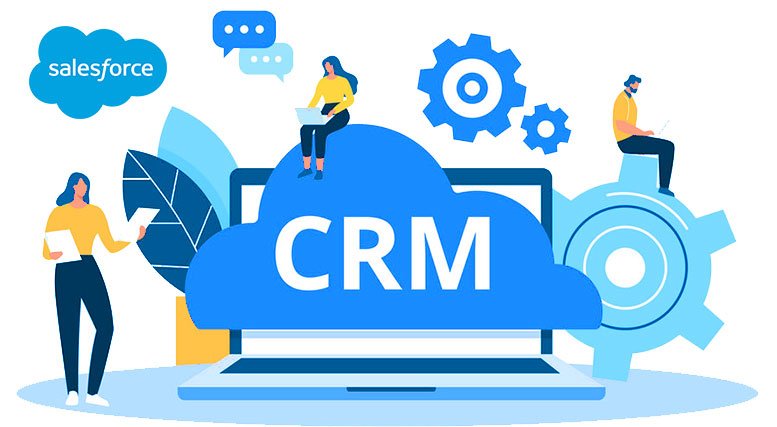Here’s how a CRM system can help your business today.

What is CRM?
Customer relationship management (CRM) is a technology for managing all your company’s relationships and interactions with customers and potential customers. The goal is simple: Improve business relationships to grow your business. A CRM system helps companies stay connected to customers, streamline processes, and improve profitability.
When people talk about CRM, they are usually referring to a CRM system, a tool that helps with contact management, sales management, agent productivity, and more. CRM tools can now be used to manage customer relationships across the entire customer lifecycle, spanning marketing, sales, digital commerce, and customer service interactions.
A CRM solution helps you focus on your organization’s relationships with individual people — including customers, service users, colleagues, or suppliers — throughout your lifecycle with them, including finding new customers, winning their business, and providing support and additional services throughout the relationship.
Who is CRM for?
A CRM system gives everyone — from sales, customer service, business development, recruiting, marketing, or any other line of business — a better way to manage the external interactions and relationships that drive success. A CRM tool lets you store customer and prospect contact information, identify sales opportunities, record service issues, and manage marketing campaigns, all in one central location — and make information about every customer interaction available to anyone at your company who might need it.
With visibility and easy access to data, it's easier to collaborate and increase productivity. Everyone in your company can see how customers have been communicated with, what they’ve bought, when they last purchased, what they paid, and so much more. CRM can help companies of all sizes drive business growth, and it can be especially beneficial to a small business, where teams often need to find ways to do more with less.
Here’s why CRM matters to your business.
CRM is the largest and fastest-growing enterprise application software category, and worldwide spending on CRM is expected to reach USD $114.4 billion by the year 2027. If your business is going to last, you need a strategy for the future that’s centered around your customers and enabled by the right technology. You have targets for sales, business objectives, and profitability. But getting up-to-date, reliable information on your progress can be tricky. How do you translate the many streams of data coming in from sales, customer service, marketing, and social media monitoring into useful business information?
A CRM system can give you a clear overview of your customers. You can see everything in one place — a simple, customizable dashboard that can tell you a customer’s previous history with you, the status of their orders, any outstanding customer service issues, and more. You can even choose to include information from their public social media activity — their likes and dislikes, what they are saying and sharing about you or your competitors. Marketers can use a CRM solution to manage and optimize campaigns and lead journeys with a data-driven approach, and better understand the pipeline of sales or prospects coming in, making forecasting simpler and more accurate. You’ll have clear visibility of every opportunity or lead, showing you a clear path from inquiries to sales. Some of the biggest gains in productivity and in making a whole-company shift to customer-centricity can come from moving beyond CRM as just a sales and marketing tool and embedding it in your business — from finance to customer services and supply chain management. This helps to ensure that customer needs are at the forefront of business process and innovation cycles.
Though CRM systems have traditionally been used as sales and marketing tools, customer service and support is a rising segment of CRM and a critical piece in managing a holistic customer relationship. Today’s customer might raise an issue in one channel — say, Twitter — and then switch to email or telephone to resolve it in private. A CRM platform lets you manage the inquiry across channels without losing track, and gives sales, service, and marketing a single view of the customer to inform their activities. The ability to connect these three functions, and the teams that deliver them, on one platform and with one view to the customer, is invaluable for delivering relevant, connected experiences.
Running a business without CRM can cost you real money.
More administration means less time for everything else. An active sales team can generate a flood of data. Reps are out on the road talking to customers, meeting prospects, and finding out valuable information — but all too often this information gets stored in handwritten notes, laptops, or inside the heads of your salespeople.
Details can get lost, meetings are not followed up on promptly, and prioritizing customers can be a matter of guesswork rather than a rigorous exercise based on data. And it can all be compounded if a key salesperson moves on. But it's not just sales that suffers without CRM.
Your customers may be contacting you on a range of different platforms — including phone, email, or social media — asking questions, following up on orders, or contacting you about an issue. Without a common platform for customer interactions, communications can be missed or lost in the flood of information, leading to a slow or unsatisfactory response.
Even if you do successfully collect all this data, you’re faced with the challenge of making sense of it. It can be difficult to extract intelligence. Reports can be hard to create, and they can waste valuable selling time. Managers can lose sight of what their teams are up to, which means that they can’t offer the right support at the right time — while a lack of oversight can also result in a lack of accountability from the team.
What does a CRM system do?
A customer relationship management (CRM) solution helps you find new customers, win their business, and keep them happy by organizing customer and prospect information in a way that helps you build stronger relationships with them and grow your business faster. CRM systems start by collecting a customer's website, email, telephone, and social media data — and more — across multiple sources and channels. It may also automatically pull in other information, such as recent news about the company's activity, and it can store personal details, such as a client's personal preferences on communications. The CRM tool organizes this information to give you a complete record of individuals and companies overall, so you can better understand your relationship over time.
With a consolidated view of every prospect and customer, a CRM system is then used to manage day-to-day customer activities and interactions. From a marketing perspective, this means engaging your prospects with the right message, at the right time, through targeted digital marketing campaigns and journeys. For sales, reps can work faster and smarter with a clear view of their pipeline and accomplish more accurate forecasting. Commerce teams can quickly launch and scale ecommerce — from online orders to curbside pickup — for their consumer shoppers (B2C commerce) and business buyers (B2B commerce). And customer service agents can respond to customer needs on any channel — from home, in the field, or in the office.
A CRM platform can also connect to other business apps that help you to develop customer relationships. CRM solutions today are more open and can integrate with your favorite business tools, such as document signing, accounting, and billing, and surveys, so that information flows both ways to give you a true 360-degree view of your customer.
And a new generation of CRM goes one step further: Built-in intelligence and AI automate administrative tasks, like data entry and lead or service case routing, so you can free up time for more valuable activities. Automatically generated insights help you understand your customers better, even predicting how they will feel and act so that you can prepare the right outreach. AI also helps you to find opportunities that may be hidden in your business data.
To learn more about CRM and Salesforce, please contact us at https://www.beryl8.com/th/contact-us



